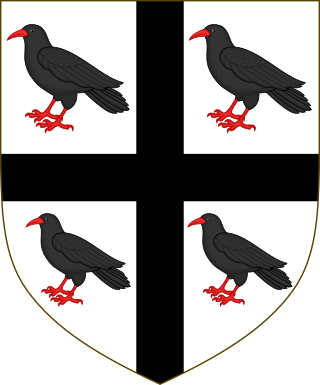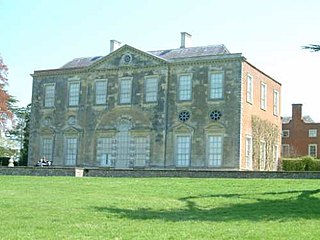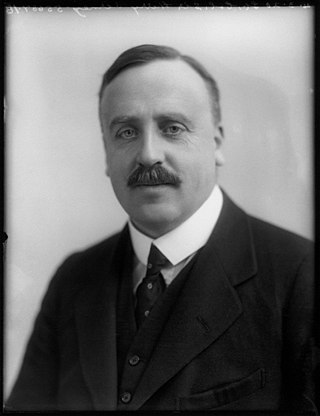Related Research Articles

Earl of Rosslyn is a title in the Peerage of the United Kingdom. It was created in 1801 for Alexander Wedderburn, 1st Baron Loughborough, Lord Chancellor from 1793 to 1801, with special remainder to his nephew Sir James St Clair-Erskine, as Wedderburn had no surviving issue of his own. Wedderburn had already been created Baron Loughborough, of Loughborough in the County of Leicester, in the Peerage of Great Britain in 1780, with normal remainder to the heirs male of his body, and Baron Loughborough, of Loughborough in the County of Surrey, in the Peerage of Great Britain in 1795, with the same remainder as the earldom. The 1780 barony became extinct upon his death, but the 1795 barony and the earldom passed, by the special remainder, to his nephew, who thus became the second Earl of Rosslyn. The second Earl was a Lieutenant-General in the Army and also held political office as Lord Privy Seal and Lord President of the Council.

Earl of Iddesleigh, in the County of Devon, is a title in the Peerage of the United Kingdom. It was created in 1885 for the Conservative politician Sir Stafford Northcote, 8th Baronet, of Pynes in the parish of Upton Pyne near Exeter in Devon and lord of the manor of Iddesleigh, 28 miles north-west of Pynes. He served as President of the Board of Trade, Secretary of State for India, Chancellor of the Exchequer, First Lord of the Treasury and Foreign Secretary and was Joint Leader of the Conservative Party from 1881 to 1885. Northcote was made Viscount St Cyres, of Newton Saint Cyres in the County of Devon, at the same time he was given the earldom. This title is also in the Peerage of the United Kingdom.

Lord Aylmer, Baron of Balrath, in the County of Meath, is a title in the Peerage of Ireland. It was created in 1718 for the naval commander Matthew Aylmer, the second son of Sir Christopher Aylmer, 1st Baronet, of Balrath. Lord Aylmer's son, the second Baron, represented Rye in the House of Commons. The latter's grandson, the fourth Baron, succeeded his kinsman as seventh Baronet, of Balrath, in 1776. The titles remain united. He was succeeded in both titles by his son, the fifth Baron. He was a general in the Army and served as Governor General of Canada from 1830 to 1835. Lord Aylmer assumed by Royal licence the additional surname of Whitworth in 1825 on the death of his uncle Charles Whitworth, 1st Earl Whitworth. On his death, the titles passed to his younger brother, the sixth Baron. He was an admiral in the Royal Navy.

Baron Stanley of Alderley, in the County of Chester, is a title in the Peerage of the United Kingdom. It was created in 1839 for the politician and landowner Sir John Stanley, 7th Baronet.

Baron Grimthorpe, of Grimthorpe in the East Riding of the County of York, is a title in the Peerage of the United Kingdom. It was created on 17 February 1886 for the lawyer and architect Edmund Beckett, 5th Baronet, with remainder to the heirs male of his father. He was succeeded according to the special remainder by his nephew, the second Baron. He had earlier represented Grimsby in Parliament. As of 2014 the titles are held by the latter's great-grandson, the fifth Baron, who succeeded his father in 2003.

Baron Avebury, of Avebury in the County of Wiltshire, is a title in the Peerage of the United Kingdom. It was created 22 January 1900 for the banker, politician and archaeologist Sir John Lubbock, 4th Baronet. He was succeeded by his eldest son, the second Baron. On his death the titles passed to his nephew, the third Baron. He was the son of Harold Fox Pitt Lubbock, fourth son of the first Baron, who died in 1971. The title then passed to the third Baron's first cousin, the fourth Baron, the son of Maurice Fox Pitt Lubbock, sixth son of the first Baron. The fourth baron was a Liberal Democrat politician and one of the ninety excepted hereditary peers who remained in the House of Lords after the passing of the House of Lords Act 1999. He was succeeded by his son, the fifth Baron, in 2016.

Baron Poltimore, of Poltimore in the County of Devon, is a title in the Peerage of the United Kingdom. It was created in 1831 for Sir George Bampfylde, 6th Baronet. His son, the second Baron, held office as Treasurer of the Household from 1872 to 1874 in the first Liberal administration of William Ewart Gladstone.

Baron Moncreiff, of Tulliebole in the County of Kinross, is a title in the Peerage of the United Kingdom. It was created on 9 January 1874 for the lawyer and Liberal politician Sir James Moncreiff, 1st Baronet. He had already been created a Baronet, of Kilduff in the County of Kinross, in the Baronetage of the United Kingdom on 23 May 1871. In 1883 Lord Moncreiff also succeeded his elder brother as 11th Baronet, of Moncreiff in the County of Perth. On his death the titles passed to his eldest son, the second Baron. He was a Judge of the Court of Session from 1888 to 1905 under the title of Lord Wellwood and served as Lord Lieutenant of Kinross-shire between 1901 and 1909. He was succeeded by his younger brother, the third Baron. He was a clergyman. As of 2010 the titles are held by the latter's great-grandson, the sixth Baron, who succeeded his father in 2002.

Baron Rothschild, of Tring in the County of Hertfordshire, is a title in the Peerage of the United Kingdom. It was created in 1885 for Sir Nathan Rothschild, 2nd Baronet, a member of the Rothschild banking family. He was the first Jewish member of the House of Lords not to have previously converted to Christianity. The current holder of the title is Jacob Rothschild, 4th Baron Rothschild, who inherited the barony in 1990.

Sir Henry Morton Llewellyn, 3rd Baronet, was a British equestrian champion. He was born the second son of a colliery owner, Sir David Llewellyn, 1st Baronet.
Sir Harry Sedan Waechter, 1st Baronet was a British businessman and philanthropist.

Sir Max Leonard Waechter was a businessman, art collector, philanthropist and advocate of a federal Europe.

There have been three baronetcies held by persons with the surname Verney, one in the Baronetage of England and two in the Baronetage of the United Kingdom. Two of the creations are extant as of 2016.
There have been five Baronetcies created for people with the surname Forbes, four in the Baronetage of Nova Scotia and one in the Baronetage of the United Kingdom. The first holder of the Burn Baronetcy of Jessfield, created in the Baronetage of the United Kingdom in 1923, assumed the surname of Forbes-Leith of Fyvie in 1925.

There have been four baronetcies created for persons with the surname Hope, three in the Baronetage of Nova Scotia and one in the Baronetage of the United Kingdom. As of 2010 one creation is extant, one dormant and two extinct.

There have been three baronetcies created for persons with the surname Munro, one in the Baronetage of Nova Scotia and two in the Baronetage of the United Kingdom.

Lieutenant-Colonel Sir Harry Calvert Williams Verney, 4th Baronet, DSO, was a British Liberal politician.
There have been two baronetcies created for persons with the surname Darell, one in the Baronetage of England and one in the Baronetage of Great Britain. As of 2014 one creation is extant.
There have been five baronetcies created for persons with the surname Tyrrell, all in the Baronetage of England. All five creations are extinct, as is the Tyrell baronetcy. The six creations all claim a descent from Walter Tirell, the reputed accidental killer of King William II.
There have been three baronetcies created for people with the surname Moncreiffe or Moncreiff, two in the Baronetage of Nova Scotia and one in the Baronetage of the United Kingdom. Two of the titles are dormant, as the heir has not proved his descent, and one is extant, though its holder does not bear the surname of Moncreiffe.